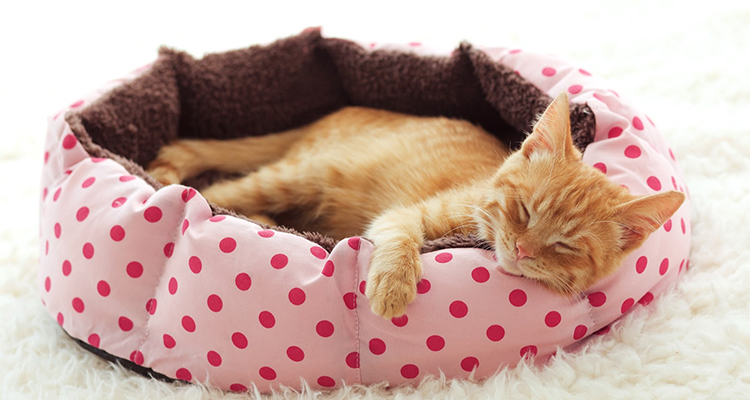
Why does my cat smell bad? Cats are known for being extremely clean creatures, however, sometimes owners notice that their cat has developed an unusual odour. You may wonder why your cat smells bad and if it is a serious cause for concern. Cats can smell for various reasons, from poor grooming habits to illness, so understanding your cat’s health is the key to ensuring the well-being of your feline.
Common causes of cat odour
Why does my cat smell? Check out our headers below for more information about why your cat might smell bad.
Poor grooming habits
Why does my cat’s coat smell? Poor grooming habits can cause your cat to smell bad. Cats are careful groomers. Learning how to groom your cat can not only strengthen your bond but also help you identify when something might be wrong, as poor grooming is often a sign of underlying issues.If your cat isn’t grooming itself properly, it could be due to age, obesity, illness, or stress. It is important to find the root cause. If you suspect your cat isn’t cleaning itself properly, we advise that you take it to the vet for a checkup.
Dental issues
Why does my cat’s breath smell? Dental problems in cats can cause halitosis (bad breath). Dental issues in older cats are more common. You may notice signs like drooling when purring, bleeding from the mouth, difficulty eating, and behavioural changes because of oral discomfort. This includes being quieter than usual, shying away from being stroked and being reluctant to let anyone touch their head or face. A daily oral care routine—including toothbrushing, vet check-ups, and a complete and balanced diet—can help maintain your cat’s dental health. While dental treats can be beneficial, it's important to know how many treats a cat can have to avoid overfeeding.
Why do cats smell after eating? Just like humans, a cat's breath may smell of the food it has eaten for a while after eating; this is perfectly normal. Cats lick the fur around their mouth and lick their paws to effectively wash their faces after eating, and the smell of food can often be smelt on their faces and legs, too.
Skin conditions
Why does my cat’s coat smell bad? Skin infections, fleas, allergies, wounds and dermatitis can also cause your cat to smell. The most common symptoms include itching, redness, damp patches on the coat and dandruff. Dealing with fleas can be difficult and even more hard to get rid of due to their lifecycle and it may take weeks or months to clear an infestation completely. Prevention is key, monthly treatments from your vet or pet shop are essential. It’s always best to visit your vet for advice if you suspect your cat has a skin condition, skin conditions can cause severe discomfort to the cat and medications to treat the problem and soothe the condition can be prescribed.
Gland problems
My cat smells, could it be related to their anal glands? Yes, sometimes your cat’s anal glands can cause foul odours. Cats have two anal glands, also known as sacs, located internally on both sides of their anus. These small sacs release a foul-smelling fluid used to mark the cat’s territory every time they poop. If the glands don't empty properly, they can become infected, impacted or just a bit uncomfortable. Look out for other telltale signs such as scooting, excessive licking around the area or a fishy smell. Visit your vet for treatment advice if you suspect an anal gland problem is causing your cat to smell.
Ear infections
Do cats smell when they have an ear infection? Yes, a musty or yeasty cat smell is associated with ear infections. Wax, ear mites or harmful bacteria can all result in ear infections in cats. Ear infections can cause discomfort, discharge, head tilting and odour. Ear infections may also cause hearing loss if they are not addressed by a vet. If you see signs of an ear infection, schedule an appointment with your local vet.
Environmental factors that can affect cat smelling
Smelly litter box
My cat smells, could it be the litter tray? A dirty litter box could be causing the odor. Cats are much more comfortable with a clean litter tray, and keeping it clean plays an important role in their litter-tray training. You should change the litter tray completely as often as the brand of litter advises and always do a spot clean at least once a day. This will help keep foul odours at bay and your cat will be content. If their litter tray is too dirty they may start eliminating outside of it, which will cause even more foul smells. A clean litter tray is key!
External sources
Do cats always smell after being outside? Cats can also pick up bad smells from their surroundings, this is especially true if they roam outdoors frequently. Odours from bins, trash, chemicals or dead animals may make your cat smell. You can help ease these odours by brushing your cat’s fur, bathing them when necessary or using cleansing pet wipes.
Health concerns linked to different cat smells
Other serious health concerns are also associated with cat smells. For example, UTIs (urinary tract infections) can cause your cat to smell. This odour is usually described as strong and fishy. Look out for signs of UTIs such as strong-smelling urine, frequent urination and straining or peeing outside the litter tray. Take your pet to the vet if you think they may be suffering from a UTI.
Cats with kidney problems can have a strong ammonia-like smell on their breath. Kidney problems can also cause a dry coat, bloody urine, increased thirst, frequent urination, weight loss, vomiting and lethargy. Kidney disease is more likely in senior cats. Early detection is key to managing this disease, so take your pet to the vet to discuss treatment options if you suspect something is wrong.
There is also a connection between diabetes and odour in cats. One of the signs of diabetes is a fruity smell on your cat’s breath. Other signs of diabetes to be mindful of are increased urination, urination around the house, weight loss, increased appetite, vomiting and lethargy. Take your cat to the vet as soon as possible if you suspect they have any of these signs.
How do you stop a cat from smelling?
It's normal for cats to get a bit smelly from time to time, here are our top tips for maintaining proper hygiene for cats.
- Grooming your cat often can help keep any unwanted odours in check.
- We all know cats hate water and therefore bathing is not advised, but cats do love to be clean so you could fill a bowl with warm water, wet and wring out cotton wool pads or flannels and gently wipe around the cat's face and body, without getting them wet but making them feel clean and fresh.
- A healthy skin and coat starts with good nutrition providing nourishment from the inside. Always feed complete and balanced cat food with nutrients tailored for the life-stage and life-style of your cat and look for products that have added ingredients to enhance your cat's skin and coat. Your cat’s coat as well as their dental health, are etwo factors that can contribute to odour in cats. Fatty acids found in fish are great for your pet’s coat.
Why does my cat smell - conclusion
It is normal for your cat’s breath to smell a little after eating food or exploring outdoors; some odours are harmless. However, bad breath and other strong fishy smells could be a sign of health issues such as kidney disease, diabetes, ear infections, gland issues, or skin problems. So, if any unpleasant smell is persistent, a checkup at the vet is advised.
Why does my cat smells - FAQs
Is it normal for cats to smell bad?
It is perfectly normal for a cat to smell bad occasionally, after eating or running around outdoors. However, if the smell is strong, persistent or fishy, it could be a sign of an underlying health condition. Always seek advice from your vet if you suspect something is wrong.
Why does my cat smell bad after a bath?
Why does my cat smell bad after a bath? Your cat may still smell after a bath because there is an underlying health condition at play. If the smell is strong, persistent and fishy, seek advice from your vet. It could be a sign of illness such as kidney disease, ear infections, diabetes or a skin condition.
Can you remove cat scent glands?
Cats can naturally produce a strong smell from their anal glands, which is used to mark their territory when they poop. Vets will not remove these glands unless there is something wrong with them as it can cause faecal incontinence, they are a perfectly normal function for a healthy cat.














